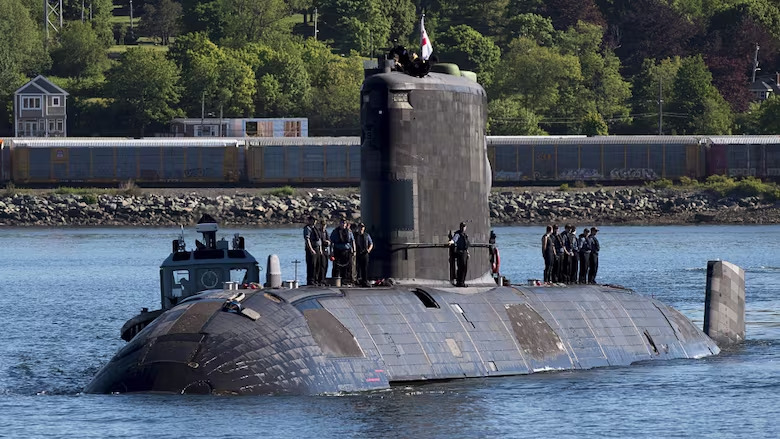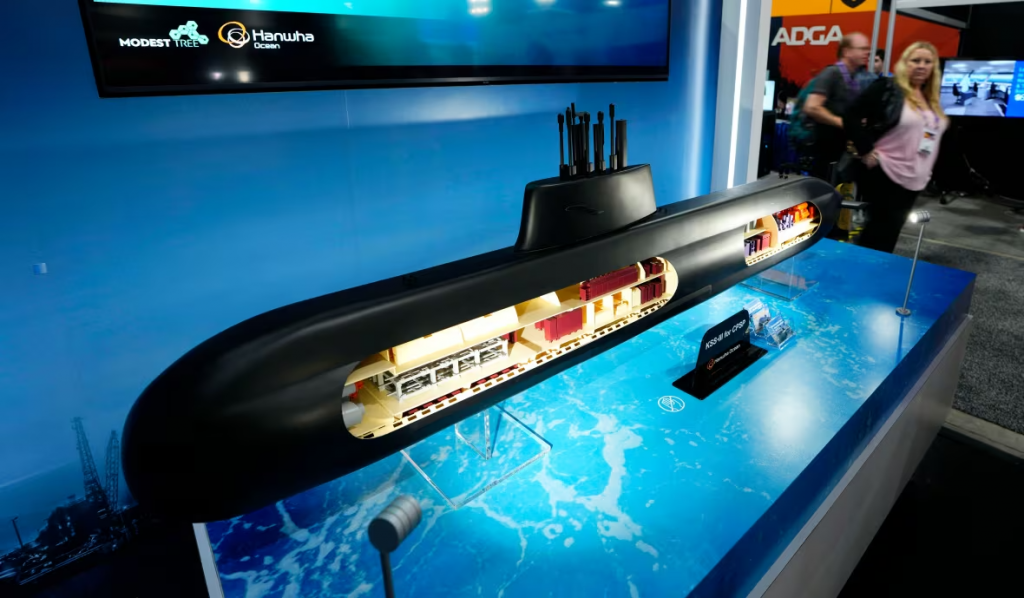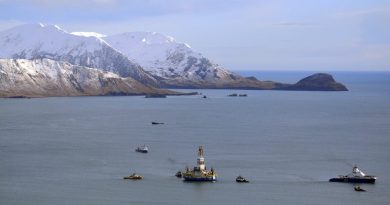German, Norwegian officials urge Canada to join ‘familiar family’ in buying new submarines

Officials pitch working with long-standing traditional NATO allies for military buildup
Senior German and Norwegian defence officials say they’re confident Canada will sign on to the ReArm Europe plan in the coming weeks and such a move will make it easier for the Liberal government to buy new submarines from allies.
Jasper Wieck, the political director of the German Ministry of Defence, and Norway’s program director of submarines, Capt. (N) Oystein Storebo, spoke with CBC News recently about the pitch for Canada to join their existing partnership, in which the two nations are constructing cutting-edge boats that will begin to enter service in 2028.
Competition for the multibillion-dollar defence program is heating up and their remarks come weeks after two South Korean shipyards, in a joint venture, submitted a detailed, unsolicited proposal worth up to $24 billion, to build 12 submarines for the Royal Canadian Navy.
A number of shipyards in several countries responded last fall to a request for information from the federal government, but only the South Koreans went a step further and delivered a detailed bid, claiming they could deliver four boats to Canada by 2035 — the deadline set by the navy to receive its first new submarine.

At last summer’s NATO summit, former prime minister Justin Trudeau signed a trilateral letter of intent with Germany and Norway to establish a strategic partnership. The aim of that agreement is to strengthen maritime security co-operation in the North Atlantic in support of NATO’s deterrence and defence.
Wieck says that agreement, plus the rearmament program, are important for both Europe and Canada as the West tries to face down the threat of potential Russian aggression.
“It’s a partnership that has so many benefits from both sides,” Wieck said. “Once Canada would have signed the security and defence partnership with the European Union, Canada will be considered as an EU member state in all these European schemes and all these European incentives.”
Both Norway and the U.K. are not members of the EU but are deeply involved in the rearmament plan.
“It is about [the] collective effort by Europeans, not only to buy collectively, but to maintain collectively and train collectively and operate collectively,” Wieck told CBC News in an interview.
Pitch to work with old allies
Storebo argued there’s something to be said for partnerships with long-standing traditional NATO allies — an argument that has become central to backroom European pushback against the South Korean bid.
“I think we’re offering a real partnership, maybe industry to industry, government to government, to join a family which is familiar,” Storebo said.
Beyond answering Canada’s request for information, which is essentially an expression of interest, the German shipyard leading the bid, ThyssenKrupp Marine Systems (tkMS), said it’s not submitted any further information and is waiting for the formal Canadian government process to get underway.
Germany and Norway have been involved for several years in the joint submarine construction program. Designated as the 212CD, the boats are based on the well-established German Type 212A design, which is operated by both the German and Italian navies.
The 212CD was designed for operations in all oceans, but is more than capable with its air-independent propulsion of staying submerged in the Arctic for up to three weeks, Storebo said.
Six 212CDs are currently under construction — two for Germany and four for Norway — as part of an $8.1-billion (5.5-billion Euro) program.
The German Navy will receive its first 212CD in 2028 while Norway is expected to be in the water the following year.
Oliver Burkhard, the CEO of tkMS, said should Canada join the current program it’s possible the first Canadian boat could arrive within its requested timeframe. Although, he said, much depends on the Canadian government and how swiftly it moves.
Slipping into the production line at this point would likely involve redesigning one of the submarines already earmarked for either Germany or Norway, Burkhard said.
“I think there are opportunities to debate if one of those is maybe the first Canadian one,” he said.
The tkMS pitch also involves a plan to construct a submarine maintenance facility in Canada, creating jobs for Canadians — an important condition the Liberal government has repeatedly underlined.
When proposed last year, the intention of the Canada, Germany, Norway trilateral partnership was to strike a wide-ranging security pact similar to — but a step down from — AUKUS, the defence agreement involving the United States, United Kingdom and Australia.
At the heart of AUKUS was a deal for Australia to acquire nuclear submarines and technology, something Canada is not interested in, although there was political consternation in Ottawa about being left out of the deal.
Related stories from around the North:
Canada: Carney says Canada is looking to join major European military buildup by July 1, CBC News
Denmark: Danish PM pledges to support Greenland against Trump pressure, Thomson Reuters
Finland: US, Norwegian forces in Lapland for rapid reinforcement exercise, The Independent Barents Observer
Iceland: Iceland’s FM announces defence review, calls revamped security policy ‘urgent’, Eye on the Arctic
Norway: Preparing for trouble, Norway erects fence at exposed border sections, CBC News
Russia: Drone attack on Russian warplanes, including in Arctic, serious blow to strategic arsenal, The Associated Press
Sweden: Sweden’s Armed Forces: Railways must function without modern technology, Radio Sweden
United States: White House releases U.S. Arctic strategy implementation plan, Eye on the Arctic



